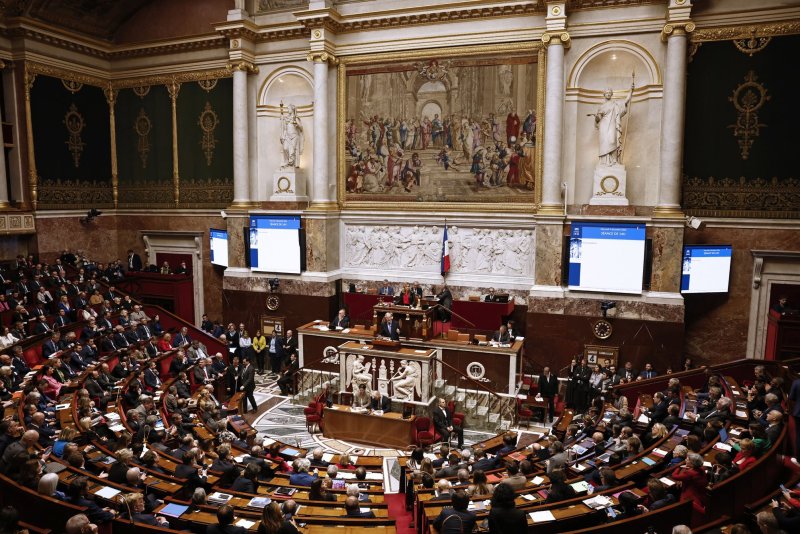1 of 2 | French Prime Minister Michel Barnier delivers a speech during a no-confidence vote against his government at the National Assembly, in Paris, France, on Wednesday. A coalition of right- and left-leaning ministers voted 331 to 247 to approve a no-confidence motion and force Barnier, 73, to resign. Photo by Yoan Valat/EPA-EFE
Dec. 4 (UPI) — French Prime Minister Michel Barnier lacks the confidence of France’s National Assembly, which on Wednesday night voted to force his resignation while approving a “no-confidence” motion.
A coalition of right- and left-leaning ministers voted 331 to 247 to approve a no-confidence motion and force Barnier, 73, to resign.
Barnier’s removal comes just three months after he became prime minister in September. He held the office for the shortest time in French history.
Barnier’s removal signals a collapse of the French government, which will be run by the remnants of Barnier’s cabinet until President Emmanuel Macron names a new prime minister to form a new government.
Following recent parliamentary elections, Barnier formed a minority centrist and center-right government that is outnumbered by the combined members of the leftist New Popular Front and conservative National Rally.
Those parties had enough members to successfully vote “no confidence” in Barnier’s government and cause its collapse.
Much of the current problem arose after Macron in June dissolved the National Assembly, which required a snap election to seat a new law-making body.
The resulting election seated roughly equal numbers of right, left and centrist parties, which led to the right and left political factions banding together to oppose Barnier’s centrist party.
Barnier on Monday used special powers to force through a budget with a controversial social security measure without seeking a vote of National Assembly members.
Barnier resorted to the special powers because his centrist party lacked the votes needed to approve the social security budget without the support of either the right or left political factions in the National Assembly.
Forcing the social security measure through without a vote of the National Assembly gave the ministers the ability to challenge Barnier’s government with the no-confidence vote.
The right and left opposition parties formed an ad-hoc coalition with a combined majority of 27 seats, which enabled the no-confidence vote to succeed after considering two motions of no confidence.
It is the first time since 1962 that a French government collapsed due to a no-confidence vote in the National Assembly.
The successful no-confidence vote means Macron has to form a new government, just 90 days after he named Barnier France’s prime minister.
The French Constitution requires at least a year between National Assembly elections, which means a new election to re-seat the National Assembly can’t be held until June.
The election delay makes it more difficult for Macron to seat a new government.
